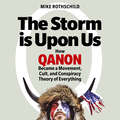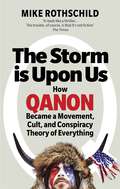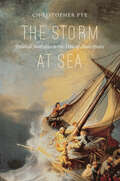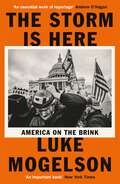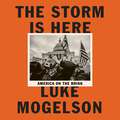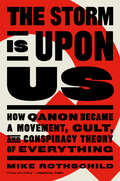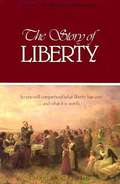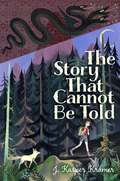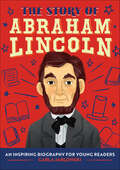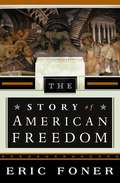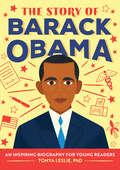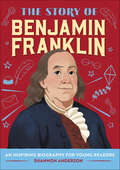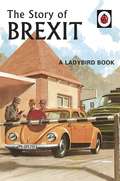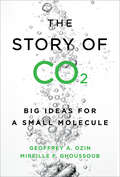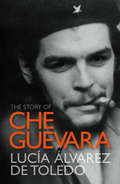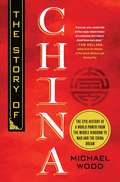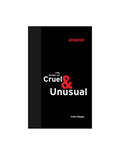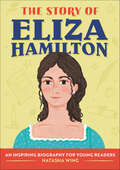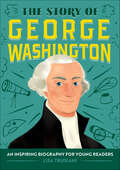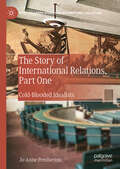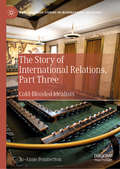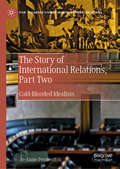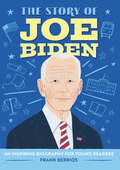- Table View
- List View
The Storm Is Upon Us: How QAnon Became a Movement, Cult, and Conspiracy Theory of Everything
by Mike Rothschild***"An ideal tour guide for your journey into the depths of the rabbit hole that is QAnon, and even shows you a glimmer of light at the exit." - Cullen Hoback, director of HBO's Q: Into the StormIn 2017, President Trump made a cryptic remark at a gathering of military officials, describing it as 'the calm before the storm'-then refused to explain himself to puzzled journalists. But on internet message boards, a mysterious poster called 'Q Clearance Patriot' began an elaboration all of their own.Q's wild yarn hinted at a vast conspiracy that satisfied the deepest desires of MAGA-America. None of Q's predictions came to pass. But did that stop people from clinging to every word, expanding Q's mythology, and promoting it ever more widely? No.Conspiracy culture expert Mike Rothschild is uniquely equipped to explain QAnon, from the cults that first fed into it, to its embrace by Trump and the right-wing media. With families torn apart and with the Capitol under attack, he argues that mocking the madness of QAnon will get us nowhere. Instead, he argues that QAnon tells us everything we need to know about global fear after Trump-and that we need to understand it now, because it's not going away.(p) 2021 Octopus Publishing Group
The Storm Is Upon Us: How QAnon Became a Movement, Cult, and Conspiracy Theory of Everything
by Mike Rothschild*****'A chilling overview of a movement that should arguably have no place in any healthy, well-educated society.' - The Telegraph'A compelling book.' - The Guardian'The Storm Is Upon Us is an impressive piece of research and a gripping read. Rothschild's book reads like a thriller, with cliffhangers that leave you eager for the next episode. The trouble, of course, is that it's not fiction.' - The Times'An ideal tour guide for your journey into the depths of the rabbit hole that is QAnon, and even shows you a glimmer of light at the exit.' - Cullen Hoback, director of HBO's Q: Into the StormIn 2017, President Trump made a cryptic remark at a gathering of military officials, describing it as 'the calm before the storm'-then refused to explain himself to puzzled journalists. But on internet message boards, a mysterious poster called 'Q Clearance Patriot' began an elaboration all of their own.Q's wild yarn hinted at a vast conspiracy that satisfied the deepest desires of MAGA-America. None of Q's predictions came to pass. But did that stop people from clinging to every word, expanding Q's mythology, and promoting it ever more widely? No.Conspiracy culture expert Mike Rothschild is uniquely equipped to explain QAnon, from the cults that first fed into it, to its embrace by Trump and the right-wing media. With families torn apart and with the Capitol under attack, he argues that mocking the madness of QAnon will get us nowhere. Instead, he argues that QAnon tells us everything we need to know about global fear after Trump-and that we need to understand it now, because it's not going away.
The Storm at Sea: Political Aesthetics in the Time of Shakespeare
by Christopher PyeThe Storm at Sea: Political Aesthetics in the Time of Shakespeare counters a tradition of cultural analysis that judges considerations of aesthetic autonomy in the early modern context to be either anachronistic or an index of political disengagement. Pye argues that for a post-theocratic era in which the mise-en-forme of the social domain itself was for the first time at stake, the problem of the aesthetic lay at the very core of the political; it is precisely through its engagement with the question of aesthetic autonomy that early modern works most profoundly explore their relation to matters of law, state, sovereignty, and political subjectivity.Pye establishes the significance of a “creationist” political aesthetic—at once a discrete historical category and a phenomenon that troubles our familiar forms of historical accounting—and suggests that the fate of such an aesthetic is intimately bound up with the emergence of modern conceptions of the political sphere.The Storm at Sea moves historically from Leonardo da Vinci to Thomas Hobbes; it focuses on Shakespeare and English drama, with chapters on Hamlet, Othello, A Winter’s Tale, and The Tempest, as well as sustained readings of As You Like It, King Lear, Thomas Kyd’s Spanish Tragedy, and Christopher Marlowe’s Doctor Faustus. Engaging political thinkers such as Carl Schmitt, Giorgio Agamben, Claude Lefort, and Roberto Esposito, The Storm at Sea will be of interest to political theorists as well as to students of literary and visual theory.
The Storm is Here: America on the Brink
by Luke MogelsonThe New Yorker's award-winning war correspondent returns to his own country to chronicle a story of mounting civic breakdown and violent disorder, in a vivid eyewitness narrative of revelatory explanatory power.'This is a searing book, exquisitely reported, lyrically told, and so vivid it will make your heart stop-a dark journey into what ails America' Patrick Radden KeefeOn the morning of January 6, a gallows was erected on the National Mall in Washington, D.C. A little after noon, as thousands of Trump supporters marched past the structure, some paused to climb its wooden steps and take pictures of the US Capitol framed within an oval noose. Up ahead, the dull thud of stun grenades could be heard, accompanied by bright flashes. Several people carried Confederate flags. Others had Tasers, baseball bats, bear spray, and truncheons. 'They need help!' a man shouted. 'It's us versus the cops!' No one seemed surprised by what was taking place. There was an eerie sense of inexorability, mixed with nervous hesitation. It reminded me of combat: the slightly shocked, almost bashful moment when bravado, fantasy, and training crash against reality.In early 2020, Luke Mogelson, who had been living in France and covering the Global War on Terrorism, returned home to report on the social discord that the pandemic was bringing to the fore in the US. Soon, he found himself embedded with militias descending on the Michigan state capitol. From there, the story swept him on to Minneapolis, then to Portland, and ultimately to Washington, D.C. His stories for The New Yorker were hailed as essential first drafts of history. They were just the tip of the iceberg.The Storm Is Here is the definitive eyewitness account of how--during a season of sickness, economic uncertainty, and violence--a large segment of Americans became convinced that they needed to rise up against dark forces plotting to take their country away from them, and then did just that. It builds month by month, through vivid depictions of events on the ground, from the onset of the pandemic to the attack on the US Capitol--during which Mogelson was in the Senate chamber with the insurrectionists--and its aftermath. Bravely reported and beautifully written, Mogelson's book follows the tradition of some of the essential chronicles of war and unrest of our time.
The Storm is Here: America on the Brink
by Luke MogelsonThe Storm is Here is a record of a year that changed America.The New Yorker's award-winning war correspondent returns to his own country to chronicle a story of mounting civic breakdown and violent disorder, in a vivid eyewitness narrative of revelatory explanatory powerOn the morning of January 6, a gallows was erected on the National Mall in Washington, D.C. A little after noon, as thousands of Trump supporters marched past the structure, some paused to climb its wooden steps and take pictures of the US Capitol framed within an oval noose. Up ahead, the dull thud of stun grenades could be heard, accompanied by bright flashes. Several people carried Confederate flags. Others had Tasers, baseball bats, bear spray, and truncheons. 'They need help!' a man shouted. 'It's us versus the cops!' No one seemed surprised by what was taking place. There was an eerie sense of inexorability, mixed with nervous hesitation. It reminded me of combat: the slightly shocked, almost bashful moment when bravado, fantasy, and training crash against reality.In early 2020, Luke Mogelson, who had been living in France and covering the Global War on Terrorism, returned home to report on the social discord that the pandemic was bringing to the fore in the US. Soon, he found himself embedded with militias descending on the Michigan state capitol. From there, the story swept him on to Minneapolis, then to Portland, and ultimately to Washington, D.C. His stories for The New Yorker were hailed as essential first drafts of history. They were just the tip of the iceberg.The Storm Is Here is the definitive eyewitness account of how--during a season of sickness, economic uncertainty, and violence--a large segment of Americans became convinced that they needed to rise up against dark forces plotting to take their country away from them, and then did just that. It builds month by month, through vivid depictions of events on the ground, from the onset of the pandemic to the attack on the US Capitol--during which Mogelson was in the Senate chamber with the insurrectionists--and its aftermath. Bravely reported and beautifully written, Mogelson's audiobook follows the tradition of some of the essential chronicles of war and unrest of our time.(P) 2022 Penguin Audio
The Storm is Upon Us: How QAnon Became a Movement, Cult, and Conspiracy Theory of Everything
by Mike Rothschild"An ideal tour guide for your journey into the depths of the rabbit hole that is QAnon. It even shows you a glimmer of light at the exit." —Cullen Hoback, director of HBO's Q: Into the Storm Its messaging can seem cryptic, even nonsensical, yet for tens of thousands of people, it explains everything: What is QAnon, where did it come from, and is the Capitol insurgency a sign of where it&’s going next? On October 5th, 2017, President Trump made a cryptic remark in the State Dining Room at a gathering of military officials. He said it felt like &“the calm before the storm&”—then refused to elaborate as puzzled journalists asked him to explain. But on the infamous message boards of 4chan, a mysterious poster going by &“Q Clearance Patriot,&” who claimed to be in &“military intelligence,&” began the elaboration on their own. In the days that followed, Q&’s wild yarn explaining Trump's remarks began to rival the sinister intricacies of a Tom Clancy novel, while satisfying the deepest desires of MAGA-America. But did any of what Q predicted come to pass? No. Did that stop people from clinging to every word they were reading, expanding its mythology, and promoting it wider and wider? No. Why not? Who were these rapt listeners? How do they reconcile their worldview with the America they see around them? Why do their numbers keep growing? Mike Rothschild, a journalist specializing in conspiracy theories, has been collecting their stories for years, and through interviews with QAnon converts, apostates, and victims, as well as psychologists, sociologists, and academics, he is uniquely equipped to explain the movement and its followers. In The Storm Is Upon Us, he takes readers from the background conspiracies and cults that fed the Q phenomenon, to its embrace by right-wing media and Donald Trump, through the rending of families as loved ones became addicted to Q&’s increasingly violent rhetoric, to the storming of the Capitol, and on. And as the phenomenon shows no sign of calming despite Trump&’s loss of the presidency—with everyone from Baby Boomers to Millennial moms proving susceptible to its messaging—and politicians starting to openly espouse its ideology, Rothschild makes a compelling case that mocking the seeming madness of QAnon will get us nowhere. Rather, his impassioned reportage makes clear it's time to figure out what QAnon really is — because QAnon and its relentlessly dark theory of everything isn&’t done yet.
The Story Of Liberty: So You Will Comprehend What Liberty Has Cost ...and What It Is Worth
by Charles Carleton Coffin". . . if truly God had specific plans for this country and the people who were to inhabit it, have God's plans reached their fulfillment? Does America still have a rendezvous with destiny? Is there yet a generation to come forth from this nation which will turn the hearts of not only its countrymen back to the living God, but the hearts of the world as well? It is with this in mind that we have endeavored to republish Charles Coffin's The Story of Liberty, originally published in 1879. The Story of Liberty is not America's story alone. It belongs to all those who are enjoying freedom and liberty in any part of the world. And it belongs to all nations that will yet serve Him. As we reach back into the records of history to observe the hand of the Great Author of all liberty, we will find direction for the days ahead and discover the keys we need to understand and interpret the future. As we look at that which preceded our nation's history and led to its founding, we will begin to have an idea of what liberty cost those who love the truth and how much still is at stake. We cannot neglect the present and hope to enjoy in the future the blessings of the past. Liberty was purchased by Christian courage, self-sacrifice, and unceasing vigilance. Only by these virtues can we hope to keep it. We must, by God's grace, be as determined to protect our liberties as our forefathers were to win them.
The Story That Cannot Be Told
by J. Kasper KramerA powerful middle grade debut that weaves together folklore and history to tell the story of a girl finding her voice and the strength to use it during the final months of the Communist regime in Romania in 1989. <P><P>Ileana has always collected stories. Some are about the past, before the leader of her country tore down her home to make room for his golden palace; back when families had enough food, and the hot water worked on more than just Saturday nights. Others are folktales like the one she was named for, which her father used to tell her at bedtime. But some stories can get you in trouble, like the dangerous one criticizing Romania’s Communist government that Uncle Andrei published—right before he went missing. Fearing for her safety, Ileana’s parents send her to live with the grandparents she’s never met, far from the prying eyes and ears of the secret police and their spies, who could be any of the neighbors. But danger is never far away. <P><P>Now, to save her family and the village she’s come to love, Ileana will have to tell the most important story of her life.
The Story of Abraham Lincoln: An Inspiring Biography for Young Readers (The Story Of)
by Carla JablonskiHelp kids ages 6 to 9 discover the life of Abraham Lincoln—a story about honesty, leadership, and staying true to your valuesDelve into the life of the 16th president of the United States—Abraham Lincoln—a man many say is the most important president in US history. Even before he abolished slavery and reunited America, Abraham was a hard-working kid who believed in freedom for everyone.He soon discovered that by learning as much as he could, he would be able to help people and change the world for the better. Explore how he went from being a poor farm boy with a dream to one of the most powerful leaders in US history.Independent reading—This Abraham Lincoln biography is broken down into short chapters and simple language so kids 6 to 9 can read and learn on their own.Critical thinking—Kids will learn the Who, What, Where, When, Why, and How of Abraham's life, find definitions of new words, discussion questions, and more.A lasting legacy—Discover a visual timeline that helps you see his place in history and how he grew into a great leader.If you've been curious about Abraham Lincoln books for kids, look no further—this one has you covered.Discover activists, artists, athletes, and more from all across history with the rest of The Story Of series, including famous figures like: George Washington, Thomas Jefferson, Barack Obama, Joe Biden, and Kamala Harris.
The Story of American Freedom
by Eric FonerA critical analysis of the evolution of American freedom, from the American Revolution through the 20th century.
The Story of Barack Obama: An Inspiring Biography for Young Readers (The Story Of)
by Tonya LeslieHelp kids ages 6 to 9 discover the life of Barack Obama—a story about hope, change, and breaking down barriersBarack Obama was the first African American president of the United States. Before he made history fighting for the environment, healthcare, and civil rights, he was a smart kid who knew he wanted to help others. He worked hard to become a lawyer, a senator, and then president, all so that he could make people's lives better.With this Barack Obama children's book, you can explore how he went from being a boy growing up in Hawaii to one of the most celebrated leaders in the world. How will his extraordinary journey inspire you?Independent reading—This Barack Obama biography is broken down into short chapters and simple language so kids 6 to 9 can read and learn on their own.Critical thinking—Kids will learn the Who, What, Where, When, Why, and How of Barack's life, find definitions of new words, discussion questions, and more.A lasting legacy—Find out how Barack Obama progressed from a kid to the president of the United States with a helpful timeline.If you've been searching for a Barack Obama children's book, The Story of Barack Obama has everything you need!Discover activists, artists, athletes, and more from all across history with the rest of The Story Of series, including famous figures like: George Washington, Thomas Jefferson, Abraham Lincoln, Joe Biden, and Kamala Harris.
The Story of Benjamin Franklin: An Inspiring Biography for Young Readers (The Story of Biographies)
by Shannon AndersonDiscover the life of Benjamin Franklin—a story about curiosity, big ideas, and helping others for kids ages 6 to 9Benjamin Franklin was a brilliant inventor, scientist, writer, and founding father. Before his ideas made him a legend, Benjamin was a young boy who enjoyed learning, helping others, and problem-solving. He was always finding clever ways to make the world a better place, from inventing the lightning rod to helping write the U.S. Constitution.Explore how Benjamin Franklin went from being a thoughtful kid growing up in Boston to an American hero who created the country's first public library, post office, hospital, and fire station in this biography for kids.Independent reading—This Benjamin Franklin biography is broken down into short chapters and simple language so kids 6 to 9 can read and learn on their own.Critical thinking—Kids will learn the Who, What, Where, When, Why, and How of Benjamin's life, find definitions of new words, discussion questions, and more.A lasting legacy—Learn about how Benjamin Franklin changed the world for future generations, including you.How will Benjamin's creative mind inspire you?Discover activists, artists, athletes, and more from across history with the rest of the Story Of series, including famous figures like: Alexander Hamilton, Eliza Hamilton, Thomas Jefferson, George Washington, and Abraham Lincoln.
The Story of Brexit (Ladybirds for Grown-Ups)
by Joel Morris Jason HazeleyAs Brexit reaches its final stretch, find a way to laugh through the pain and or celebrate the end with Ladybird's hilarious and essential guide, The Story of Brexit.'Hilarious' STYLIST________'"Leaving was the will of the people" sighs Angelica's father. He voted to leave.Angelica voted to remain, but she feels the same way. "It is the will of the people," she sighs.They stare at the ducks. They like the ducks. Ducks are better than people.'________'Brexit gave us lots of exciting new words, like brextremist, remoaner, bremoaner, remaybe, breprehensible, remaintenance, brexorcist, remaidstone, brex-girlfriend, remange, brextortion, remayhem and bregret.The new words make it harder for foreigners to understand what we are saying.In a tough, new international business world, small advantages such as this can be crucial.'________This delightful book is the latest in the series of Ladybird books which have been specially planned to help grown-ups with the world about them.The large clear script, the careful choice of words, the frequent repetition and the thoughtful matching of text with pictures all enable grown-ups to think they have taught themselves to cope. Featuring original Ladybird artwork alongside brilliantly funny, brand new text.'The latest offering in the hilarious Ladybird for Grown Ups series is a funny mickey-take of the Brexit debate (and boy, do we need some fun)' Sunday Post
The Story of CO2: Big Ideas for a Small Molecule
by Geoffrey Ozin Mireille GhoussoubThe climate crisis requires that we drastically reduce carbon dioxide emissions across all sectors of society. The Story of CO2 contributes to this vital conversation by highlighting the cutting-edge science and emerging technologies – a number of which are already commercially available – that can transform carbon dioxide into a myriad of products such as feedstock chemicals, polymers, pharmaceuticals, and fuels. This approach allows us to reconsider CO2 as a resource, and to add "carbon capture and use" to our other tools in the fight against catastrophic climate change. The Story of CO2 explores all aspects of carbon dioxide, from the atomic to the universal perspective, and takes the reader on an epic journey into our physical world, starting from the moment of the Big Bang, all the way to the present world in which atmospheric CO2 concentrations continue to grow. This story seeks to inspire readers with the latest carbon utilization technologies and explain how they fit within the broader context of carbon mitigation strategies in the shift towards a sustainable energy economy.
The Story of Che Guevara
by Lucía Álvarez de Toledo Lucía Álvarez ToledoAn accessible biography of one of the most influential figures of recent times based on new, original research.Che Guevara is something of a symbol in the West. But for the rest of the world he is different: a charismatic revolutionary who redrew the political map of Latin America and gave hope to those resisting colonialism everywhere. In The Story of Che Guevara Lucía Álvarez de Toledo follows Che from his birth in Rosario and his early years in his parent's maté plantation, to his immortal motorcycle journeys across South America, his role at the heart of Castro's new Cuban government, and through to the unforgiving jungle that formed the backdrop to his doomed campaigns in the Congo and Bolivia. Based on interviews with Che's family and those who knew him intimately, this is an accessible biography that concentrates on the man rather than the icon. With the political developments in Latin America in the twenty-first century, his influence can be seen to be even greater than it was during his lifetime and The Story of Che Guevara is a perfect introduction to an extraordinary man.
The Story of Che Guevara
by Lucía Álvarez de Toledo Lucía Álvarez ToledoAn accessible biography of one of the most influential figures of recent times based on new, original research.Che Guevara is something of a symbol in the West. But for the rest of the world he is different: a charismatic revolutionary who redrew the political map of Latin America and gave hope to those resisting colonialism everywhere. In The Story of Che Guevara Lucía Álvarez de Toledo follows Che from his birth in Rosario and his early years in his parent's maté plantation, to his immortal motorcycle journeys across South America, his role at the heart of Castro's new Cuban government, and through to the unforgiving jungle that formed the backdrop to his doomed campaigns in the Congo and Bolivia. Based on interviews with Che's family and those who knew him intimately, this is an accessible biography that concentrates on the man rather than the icon. With the political developments in Latin America in the twenty-first century, his influence can be seen to be even greater than it was during his lifetime and The Story of Che Guevara is a perfect introduction to an extraordinary man.
The Story of China: The Epic History of a World Power from the Middle Kingdom to Mao and the China Dream
by Michael WoodA single volume history of China, offering a look into the past of the global superpower and its significance today.Michael Wood has travelled the length and breadth of China, the world’s oldest civilization and longest lasting state, to tell a thrilling story of intense drama, fabulous creativity, and deep humanity that stretches back thousands of years.After a century and a half of foreign invasion, civil war, and revolution, China has once again returned to center stage as a global superpower and the world’s second largest economy. But how did it become so dominant? Wood argues that in order to comprehend the great significance of China today, we must begin with its history. The Story of China takes a fresh look at the Middle Kingdom in the light of the recent massive changes inside the country. Taking into account exciting new archeological discoveries, the book begins with China’s prehistory—the early dynasties, the origins of the Chinese state, and the roots of Chinese culture in the age of Confucius. Wood looks at particular periods and themes that are now being reevaluated by historians, such as the renaissance of the Song with its brilliant scientific discoveries. He paints a vibrant picture of the Qing Empire in the 18th century, just before the European impact, a time when China’s rich and diverse culture was at its height. Then, Wood explores the encounter with the West, the Opium Wars, the clashes with the British, and the extraordinarily rich debates in the late 19th century that pushed China along the path to modernity.Finally, he provides a clear up-to-date account of post-1949 China, including revelations about the 1989 crisis based on newly leaked inside documents, and fresh insights into the new order of President Xi Jinping. All woven together with landscape history and the author’s own travel journals, The Story of China is the indispensable book about the most intriguing and powerful country on the world stage today.
The Story of Cruel and Unusual (Boston Review)
by Colin DayanA searing indictment of the American penal system that finds the roots of the recent prisoner abuse at Abu Ghraib and Guantánamo in the steady dismantling of the Eighth Amendment's prohibition of "cruel and unusual" punishment. The revelations of prisoner abuse and torture at Abu Ghraib and more recently at Guantánamo were shocking to most Americans. And those who condemned the treatment of prisoners abroad have focused on U.S. military procedures and abuses of executive powers in the war on terror, or, more specifically, on the now-famous White House legal counsel memos on the acceptable limits of torture. But in The Story of Cruel and Unusual, Colin Dayan argues that anyone who has followed U.S. Supreme Court decisions regarding the Eighth Amendment prohibition of "cruel and unusual" punishment would recognize the prisoners' treatment at Abu Ghraib and Guantánamo as a natural extension of the language of our courts and practices in U.S. prisons. In fact, it was no coincidence that White House legal counsel referred to a series of Supreme Court decisions in the 1980s and 1990s in making its case for torture. Dayan traces the roots of "acceptable" torture to slave codes of the nineteenth century that deeply embedded the dehumanization of the incarcerated in our legal system. Although the Eighth Amendment was interpreted generously during the prisoners' rights movement of the late 1960s and 1970s, this period of judicial concern was an anomaly. Over the last thirty years, Supreme Court decisions have once again dismantled Eighth Amendment protections and rendered such words as "cruel" and "inhuman" meaningless when applied to conditions of confinement and treatment during detention. Prisoners' actual pain and suffering have been explained away in a rhetorical haze—with rationalizations, for example, that measure cruelty not by the pain or suffering inflicted, but by the intent of the person who inflicted it. The Story of Cruel and Unusual is a stunningly original work of legal scholarship, and a searing indictment of the U.S. penal system.
The Story of Eliza Hamilton: An Inspiring Biography for Young Readers (The Story of Biographies)
by Natasha WingDiscover the life of Eliza Hamilton—a story about being kind to others for kids ages 6 to 9 Eliza Hamilton was one of America's Founding Mothers. Before she made history, she was a thoughtful kid who loved spending time with family and riding her horse. Her life changed when she married Alexander Hamilton, a Founding Father who helped form the United States. After Alexander died, Eliza had his biography published so people would remember his contributions to American history. She also started an orphanage and a free school to help children. This book helps kids explore how Eliza went from being a young girl growing up in New York to an important keeper of history and a role model to many people.Independent reading—This Eliza Hamilton biography is broken down into short chapters and simple language so kids 6 to 9 can read and learn on their own.Critical thinking—Kids will learn the Who, What, Where, When, Why, and How of Eliza's life, find definitions of new words, discussion questions, and more.A lasting legacy—Find out how Eliza made the world a better place for future generations.How will Eliza's big heart and lasting legacy inspire you?Discover activists, artists, athletes, and more from across history with the rest of the Story Of series, including famous figures like: Marie Curie, Amelia Earhart, Frida Kahlo, Helen Keller, and Jane Goodall.
The Story of Ford's Theatre and the Death of Lincoln (Cornerstones of Freedom)
by Zachary KentDescribes the events leading up to the assassination of Abraham Lincoln, the conspiracy involved in that slaying, and the aftermath of the tragic event.
The Story of George Washington: An Inspiring Biography for Young Readers (The Story Of)
by Lisa TrusianiHelp kids ages 6 to 9 discover the life of George Washington—a story about fighting for independence and building a countryGeorge Washington became the first president of the United States of America and is known as the father of our country. He won the fight for American independence from England, but before that, he was a hardworking kid who enjoyed challenging himself in school and sports. He learned that overcoming challenges in his life would help make him a great leader.Explore how George went from being an ambitious farm boy in Virginia to the most well-known founding father in American history. How will his revolutionary spirit inspire you?Independent reading—This George Washington biography is broken down into short chapters and simple language so kids 6 to 9 can read and learn on their own.Critical thinking—Kids will learn the Who, What, Where, When, Why, and How of George's life, find definitions of new words, discussion questions, and more.A lasting legacy—This unique book about George Washington for kids explains how he changed the world for future generations and you.If you've been searching for fun, colorful books about George Washington for kids, look no further—this one has it all!Discover activists, artists, athletes, and more from all across history with the rest of The Story Of series, including famous figures like: Thomas Jefferson, Abraham Lincoln, Barack Obama, Joe Biden, and Kamala Harris.
The Story of International Relations, Part One: Cold-Blooded Idealists (Palgrave Studies in International Relations)
by Jo-Anne PembertonThis book is the first volume in a trilogy that traces the development of the academic subject of International Relations, or what was often referred to in the interwar years as International Studies. This first volume takes on the origins of International Relations, beginning with the League of Nations and the International Studies Conference in Berlin in 1928 and tracing its development through the Paris Peace Conference, the quest for cooperation in the Pacific, the Institute of Pacific Relations and lessons from Copenhagen, Shanghai and Manchuria. This project is an impressive and exhaustive consideration of the evolution of IR and is aptly published in celebration of the discipline's centenary.
The Story of International Relations, Part Three: Cold-Blooded Idealists (Palgrave Studies in International Relations)
by Jo-Anne PembertonThis book is the third volume in a trilogy that traces the development of the academic subject of International Relations, or what was often referred to in the interwar years as International Studies. This volume explores how International Relations progressed through the 20th century looking specifically at World War II, from the looming world war to the post-War reconstruction in Europe. This one of a kind project takes on the task of reviewing the development of IR, aptly published in celebration of the discipline’s centenary.
The Story of International Relations, Part Two: Cold-Blooded Idealists (Palgrave Studies in International Relations)
by Jo-Anne PembertonThis book is the second volume in a trilogy that traces the development of the academic subject of International Relations, or what was often referred to in the interwar years as International Studies. In this volume, the author begins with the 1932 Mission to China and conference in Milan, examines the International Studies Conference, reviews the Hoover Plan, the MacDonald Plan, the fate of the World Disarmament Conference, and the League of Nations’ role in the discipline. This one of a kind project takes on the task of reviewing the development of IR, aptly published in celebration of the discipline’s centenary.
The Story of Joe Biden: An Inspiring Biography for Young Readers (The Story of Biographies)
by Frank J. BerriosDiscover the life of Joe Biden—a story about becoming president for kids ages 6 to 9Joe Biden is the 46th president of the United States and has served his country as an important leader for many years. Before he made a name for himself in politics, Joe was a thoughtful kid who noticed America wasn't a fair place for everyone. He wanted to help make the world a better place for all people, so he became a senator and worked hard to make positive changes for Americans.Independent reading—This Joe Biden biography is broken down into short chapters and simple language so kids 6 to 9 can read and learn on their own.Critical thinking—Kids will learn the Who, What, Where, When, Why, and How of Joe's life, find definitions of new words, discussion questions, and more.A lasting legacy—A timeline of Joe Biden's life explores how he went from growing up in Pennsylvania to becoming president of the United States.How will Joe Biden's hard work and determination inspire the child in your life?Discover activists, artists, athletes, and more from all across history with the rest of The Story Of series, including famous figures like: George Washington, Thomas Jefferson, Abraham Lincoln, Barack Obama, and Kamala Harris.
